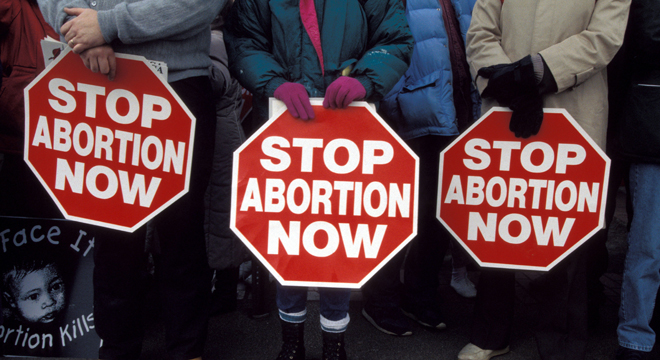One week away from election day, Mitt Romney’s campaign is assuring voters in the critical state of Ohio that Roe v. Wade, the legal underpinning of a woman’s right to have an abortion, will remain in tact if the Republican nominee is elected president.
But judicial scholars, and conservative abortion foes couldn’t disagree more. They note that a President Romney would very likely have an opportunity to replace one of the Supreme Court’s five remaining pro-Roe justices, and would be betraying decades of conservative efforts if he nominated a justice who wasn’t personally committed to overturning the precedent.
“[Norm] Coleman is out there as a Romney surrogate running up the white flag of surrender on the sanctity of human life — ‘it’s not going to be reversed,'” said Bryan Fischer, a top official at the socially conservative American Family Association, in an email to TPM. “The next president will likely appoint two or three justices to the Supreme Court, and it’s entirely possible, even likely, that the Court will take up a case before too long that could go right to the heart of Roe. Romney has pledged to appoint originalist judges who will overturn Roe should that day come, and this would be an excellent time for him to reiterate that promise.”
That’s what Coleman is trying to downplay with socially liberal Republicans in the Midwest.
“President Bush was president eight years, Roe v. Wade wasn’t reversed. He had two Supreme Court picks, Roe v. Wade wasn’t reversed,” the former senator told a Republican Jewish Coalition meeting in Beechwood, Ohio on Monday. “It’s not going to be reversed.”
Coleman’s remarks are of a piece with Romney’s closing strategy as he courts women voters and moderates: downplay divisive social issues and promise to govern as a bipartisan uniter. But Roe currently survives on a fragile Supreme Court consensus, an a President Romney would face tremendous pressure from his base to appoint conservatives who would chip away at the Court consensus on abortion rights, a goal Republican presidents have advanced for decades.
“Women’s access to abortion is likely to be significantly curtailed under a Romney Court,” UCLA constitutional law professor Adam Winkler told TPM. “If Roe wasn’t entirely overturned it’s likely that the Supreme Court would continue to gut it.”
TPM asked Romney campaign spokespersons if he would appoint judges who promise to uphold Roe, but they did not respond to requests for comment. Romney has staked out a pro-life stance as a presidential candidate, and advocated for overturning Roe. “My view is that the Supreme Court should reverse Roe v. Wade and send back to the states the responsibility for deciding whether [abortion] is legal or not,” he said last year. His campaign website decries Roe as “blatant judicial activism.”
In the Supreme Court, support for Roe v. Wade, the controversial decision holding that states may not outlaw abortion, has considerably weakened since 1973 when it was established on a 7-2 vote. Every justice appointed by a Republican president in the past 30 years has voted to chip away at Roe. No Democratic-appointed justice has voted to limit its impact.
Ronald Reagan appointed Antonin Scalia, an outspoken opponent of Roe, and Anthony Kennedy, who has a limited view of abortion rights. George H. W. Bush appointed David Souter, who voted to scale back Roe, and Clarence Thomas, who voted to overturn it entirely. In the 1992 case Planned Parenthood v. Casey, Roe came within one vote of being overturned; instead, a 5-4 majority voted to limit the scope of its protections.
In the 2000s, George W. Bush appointed John Roberts and Samuel Alito to the Court. Both voted to weaken abortion rights in the landmark 2007 case Gonzales v. Carhart. The five Republican-appointed justices voted to further weaken the scope of Roe by upholding a federal law banning late term abortions — what pro-lifers call partial birth abortions — even though the high court struck down a similar law in 2000.
The New England Journal of Medicine noted the significance of the decision — which was made possible after conservative Alito replaced the more moderate Sandra Day O’Connor. “This is the first time the Court has ever held that physicians can be prohibited from using a medical procedure deemed necessary by the physician to benefit the patient’s health,” read an article in the medical journal. “And, for the first time since Roe, the Court blesses a prohibition with no exception safeguarding a woman’s health.”
Abortion rights advocates believe that there are four votes on the Supreme Court to overturn Roe, and take Romney at his word that, if given the chance, he would appoint the fifth.
“Mitt Romney needs to hide his extremist agenda and confuse women voters in order to win,” said Jess McIntosh, a spokeswoman for the reproductive rights group EMILY’s List. “Norm Coleman’s math is bad and his facts are worse — Romney would absolutely appoint justices who would work with him to overturn Roe.”
For his part, AFA’s Fischer told TPM, “We’ve been waiting for a reversal on Roe for 39 years, and we need assurances from the Romney camp that they are as dedicated to the pro-life cause as the governor says he is.”
A President Romney would likely be positioned to do just that. Justices Ruth Bader Ginsburg, 79, and Steven Breyer, 74, both of whom support Roe, may retire during his presidency, if he’s elected. Justice Kennedy, the deciding vote not to overturn Roe entirely, is 76.










